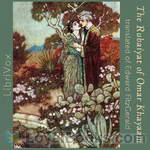 The Rubaiyat of Omar Khayyám (Whinfield Translation)
The Rubaiyat of Omar Khayyám (Whinfield Translation)
Omar Khayyám (1048–1131) was a Persian poet, mathematician and astronomer. In the Western world he is most famous for his many rubáiyát (quatrains), a four line rhyming stanza, which were popularized in an extensively reworked collection in English by Edward Fitzgerald, the first edition of which appeared in 1859. However, Fitzgerald was neither the first nor the most scholarly of the translators of Omar Khayyam’s rubáiyát. As well as translating the poems of Hafez and Rumi, Edward Henry Whinfield (1836-1922) also produced a much more extensive English version of the rubáiyát...
|
 The Rubaiyat of Omar Khayyám (Whinfield Translation)
The Rubaiyat of Omar Khayyám (Whinfield Translation)